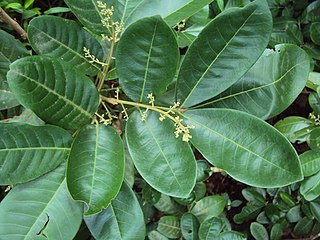
Aglaia is a genus of 117 species of woody dioecious trees belonging to the Mahogany family (Meliaceae). These trees occur in the subtropical and tropical forests of Southeast Asia, Northern Australia and the Pacific.

Antidesma is a genus of tropical plant in the family Phyllanthaceae formally described by Linnaeus in 1753. It is native to tropical Africa, S + E + SE Asia, Australia, and various oceanic islands. The greatest diversity occurs in Southeast Asia.

Agrostistachys is a plant genus of the family Euphorbiaceae first described as a genus in 1850. It is native to Southeast Asia, New Guinea, India, and Sri Lanka.
- Agrostistachys borneensisBecc. - India, Sri Lanka, Thailand, Vietnam, Malaysia, Borneo, Philippines, Sumatra, New Guinea
- Agrostistachys gaudichaudiiMüll.Arg. - Thailand, Peninsular Malaysia
- Agrostistachys hookeri(Thwaites) Benth. & Hook.f. - Sri Lanka
- Agrostistachys indicaDalzell - India, Sri Lanka, Thailand, Vietnam, Myanmar, Laos, Cambodia, Malaysia, Borneo, Philippines, New Guinea
- Agrostistachys sessilifolia(Kurz) Pax & K.Hoffm. - Peninsular Malaysia, Borneo, Sumatra
- Agrostistachys staminodiataSevilla - Sumatra

Cleistanthus is a plant genus of the family Phyllanthaceae, tribe Bridelieae, first described as a genus in 1848. It is widespread in much of the Old World Tropics in Asia, Africa, Australia, and various oceanic islands. Cleistanthus collinus is known for being toxic and may be the agent of homicides or suicides.

Kayea is a plant genus in the family Calophyllaceae. Its species range from Bangladesh and the eastern Himalayas to Sri Lanka, Indochina, Peninsular Malaysia, Borneo, Sumatra, the Philippines, New Guinea, and Queensland.
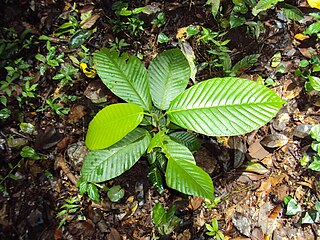
Dipterocarpus is a genus of flowering plants and the type genus of family Dipterocarpaceae.

Arenga is a genus of palms, native to Southeast Asia, southern China, New Guinea, and northern Australia. They are small to medium-sized palms, growing to 2–20 m tall, with pinnate leaves 2–12 m long. Arenga palms can grow in areas with little sunlight and relatively infertile soil.

Actinodaphne is an Asian genus of flowering plants in the laurel family (Lauraceae). It contains approximately 125 species of dioecious evergreen trees and shrubs.
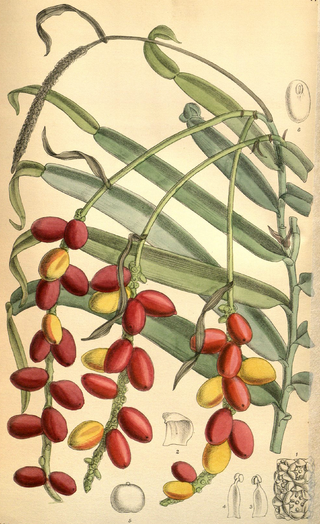
Pothos is a genus of flowering plants in the family Araceae. It is native to China, the Indian Subcontinent, Australia, New Guinea, Southeast Asia, and various islands of the Pacific and Indian Oceans.
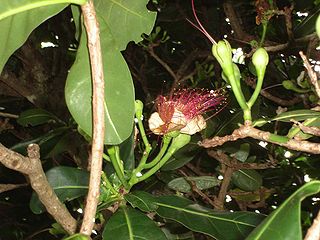
Barringtonia is a genus of flowering plants in the family Lecythidaceae first described as a genus with this name in 1775. It is native to Africa, southern Asia, Australia, and various islands of the Pacific and Indian Oceans. The genus name commemorates Daines Barrington.

Alseodaphne is a genus of plants in the family Lauraceae, endemic to China and Southeast Asia. The genus has 96 species of evergreen trees to shrubs. They have bisexual flowers, a fruit stalk that is red, green, or yellow, and black fruit.
Heliciopsis is a genus of about thirteen species of trees, constituting part of the flowering plant family Proteaceae. They grow naturally in Burma, Indo-China, SE. China, Thailand, Peninsular Malaysia, Borneo, Sumatra, Java (Indonesia) and the Philippines. The name means similar to the plant genus Helicia. Its closest relatives are Athertonia (Australia) and Virotia.
Nothaphoebe is a genus of plant in family Lauraceae. It contains 21 species, which range from mainland Southeast Asia through Indonesia and the Philippines to New Guinea.

Anisoptera is a genus of plants in the family Dipterocarpaceae. It contains ten species distributed from Chittagong in southeast of Bangladesh to New Guinea.

Homalomena is a genus of flowering plants in the family Araceae. Homalomena are found in southern Asia and the southwestern Pacific. Many Homalomena have a strong smell of anise. The name derives apparently from a mistranslated Malayan vernacular name, translated as homalos, meaning flat, and mene = moon.
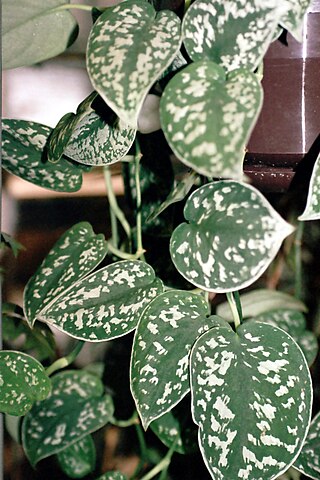
Scindapsus is a genus of flowering plants in the family Araceae. It is native to Southeast Asia, New Guinea, Queensland, and a few western Pacific islands. The species Scindapsus pictus is common in cultivation.
Anadendrum is a genus of flowering plants in the family Araceae. It is native to China and Southeast Asia.

Chisocheton is a genus of trees in the family Meliaceae. The genus name comes from the Greek schizos and chiton meaning "split tunic", referring to the lobed staminal tube of C. patens. Their range is from India and tropical China, throughout Malesia and south to New South Wales and Vanuatu.

Phrynium is a genus of flowering plants native to China, India, Southeast Asia, New Guinea and Melanesia. It was described as a genus in 1797.
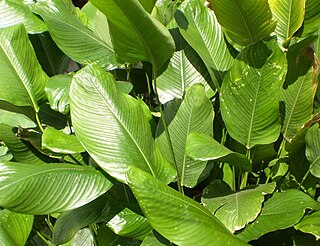
Stachyphrynium is a genus of plants native to China, the Indian Subcontinent, and Southeast Asia. It was first described as a genus with this name in 1902.

















